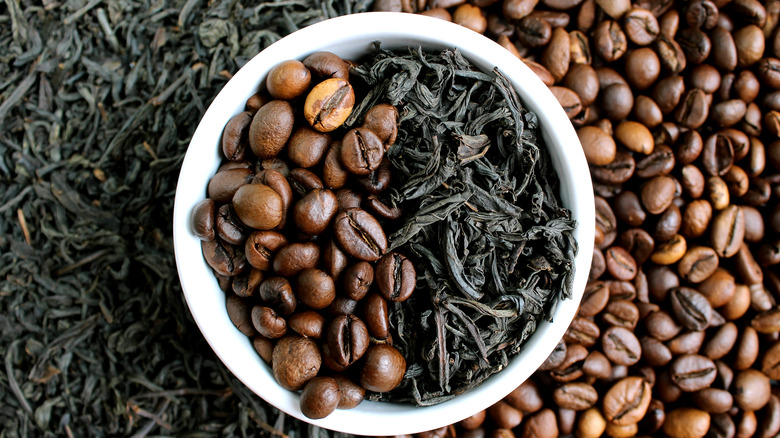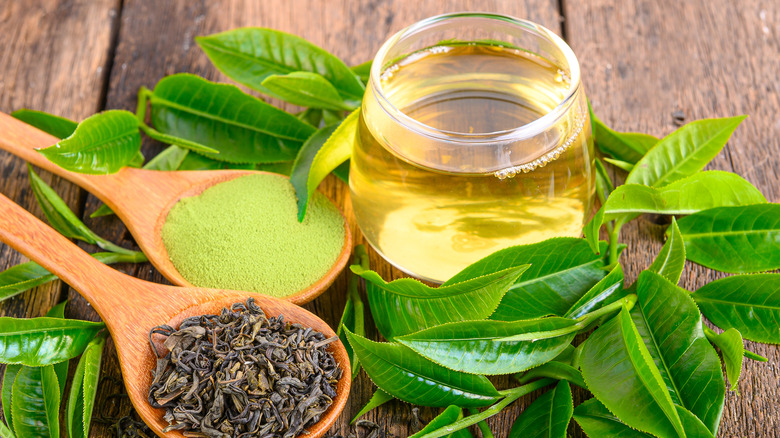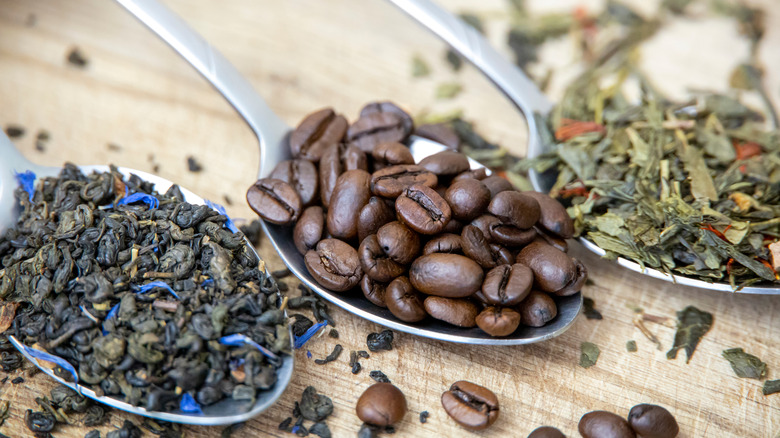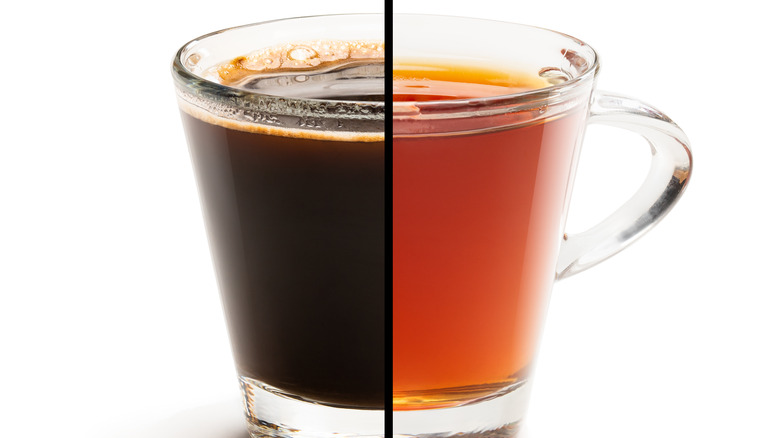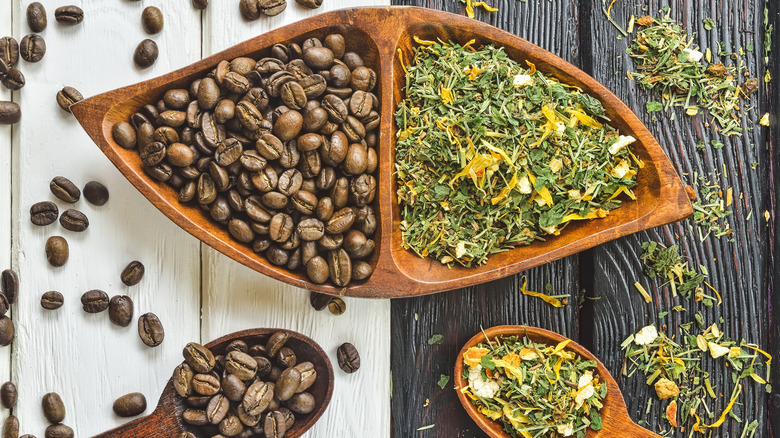Caffeine In Green Tea Vs Coffee: Which One Has More?
Many of us rely on our morning cup of coffee (or tea) to get us going, so much so that skipping this caffeinated ritual can make the whole day feel like it's dragging, and us along with it. Whether you enjoy a daily black coffee, iced latte, green tea, chai, or something else, chances are there's a beverage you can't imagine starting your morning without.
While there are tons of studies that discuss the potential negative effects of caffeine (such as this study by Sergi Ferré for the National Institute of Drug Abuse), there are also findings published in places like Johns Hopkins that demonstrate the positive and healthy effects that come from certain caffeinated drinks. Some people find that coffee makes them too jittery and opt for a lesser caffeinated option, such as green tea, but how much of a difference is there in the caffeine content of coffee as opposed to green tea?
How much caffeine is in a typical cup of green tea?
While it might seem like the caffeine content in green tea is pretty similar across different brands, it actually varies depending on several factors. Green tea typically contains less caffeine than other caffeinated teas, such as black and oolong, but it still varies greatly. According to Healthline, green tea typically contains between 35 and 50 mg of caffeine based on how the tea was brewed or processed.
The form of the tea can affect its potency, too. While loose leaf teas generally have a lower level of caffeine than bagged teas, matcha powder tends to be a bit higher in caffeine content (via Healthline). Compared to other caffeinated drinks, though, green tea has a fairly low amount of caffeine. However, that information is in contrast to the common myth that green tea contains little to no caffeine.
How much caffeine is in a typical cup of coffee?
It's no secret that coffee is the holy grail of caffeinated beverages; the ubiquitousness of this delicious brewed beverage is testament to its popularity worldwide. While the brewing and consumption styles vary between countries, one fact remains the same: people love coffee (Reuters says 64% of Americans drink it every day!). So how much caffeine are we taking in when we sip our morning joe?
According to Mayo Clinic, it depends on how the coffee is made. Brewed coffee typically contains about 96 milligrams of caffeine per eight-ounce serving (about one cup). A shot of espresso (about one ounce) usually has about 64 milligrams, while eight ounces of brewed instant coffee has about 62 milligrams. If you're tossing back a few cups of brewed coffee a day, chances are you're probably consuming upwards of 200 milligrams of caffeine. This is clearly much higher than the amount of caffeine found in a typical cup of green tea, so if you're trying to limit your caffeine intake, it might be a good idea to swap out that second or third cup of coffee for a cup of green tea instead.
Is caffeine from green tea better than coffee?
While one isn't necessarily better than the other, there are differences in the way some people may feel when consuming caffeine from green tea as opposed to coffee. L-theanine, an amino acid naturally present in tea, is known to affect the brain, increasing feelings of calmness and alertness, according to a study in Asia Pacific Journal of Clinical Nutrition. This study measured the effects on brainwave activity in participants. They gave a similar amount of L-theanine to participants that would be found in a serving of green tea. Those who consumed the L-theanine had more alpha brainwave activity, indicating a calm, alert mental state.
A 2018 study by Cambridge University explores the association between caffeine and increased anxiety, noting that it can be "implicated in the exacerbation of anxiety and sleep disorders." If you enjoy caffeine but find it occasionally increases feelings of anxiety, switching to green tea may help you experience feelings of mental alertness while consuming a lower amount of caffeine in the process. That being said, there is no evidence that there is a difference between the caffeine found in tea versus that in coffee.
What are the health benefits of both?
There are tons of health benefits to be found in both coffee and in green tea. According to Harvard Health Publishing, coffee consumption in moderation has been shown to potentially reduce risk of type 2 diabetes, uterine and liver cancer, and Alzheimer's disease. Per a 2015 study published in Circulation, it also potentially reduces the risk of death due to cardiovascular or neurological diseases.
The main compound in green tea that has been most associated with disease prevention is Epigallocatechin-3-gallate (EGCG), which has been studied for its possible protective effects against heart disease and cancer (via NCCIH). The journal Current Opinion in Clinical Nutritional and Metabolic Care found that green tea consumption "is associated with significantly reduced risks for stroke, diabetes and depression, and improved levels of glucose, cholesterol, abdominal obesity and blood pressure." Both have an array of benefits for our health, so you can feel a little better about your morning cup knowing that it's doing more for your body than just waking you up.
Are there risks in drinking too much of either?
While both green tea and coffee are safe and healthy to consume in moderation, there is a limit to everything. Too much of a good thing, as the saying goes. In an interview with Byrdie, Jennifer Maeng, MS, RD, CDN, CNSC, explains that green tea has high quantities of EGCG (also known as catechins) and tannins. "Too many tannins from green tea can reduce iron absorption in your body and lead to iron deficiency," she explains. In one instance, a 16-year-old girl drank too much green tea and "developed the condition known as herbal hepatotoxicity, which happens when too many herbs or supplements are ingested, thus leading to toxin-induced hepatitis" (via Byrdie).
While there haven't been any issues related to coffee specifically, consuming too much caffeine (usually from coffee) is not a good idea. According to Mayo Clinic, adults can safely consume about 400 milligrams of caffeine daily. The one thing you should avoid is powdered caffeine, which Mayo Clinic notes is so caffeinated it "can cause serious health problems and possibly death." However you're getting your buzz, it's best to play on the safe side and not overdo it.
